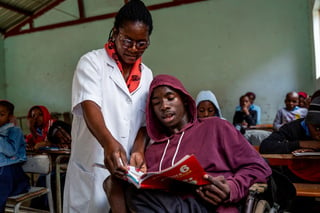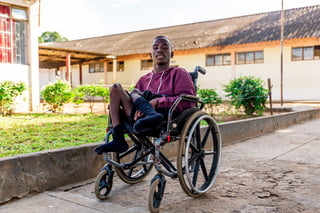Discrimination and prejudice: obstacles to education
Mario Rui Monteiro has a physical disability and uses a wheelchair to move around. The young man went to Machava A primary school in Matola, a suburb of Maputo. Unfortunately, the discrimination and obstacles he encountered forced him to drop out of school.
“A long time ago, when I was studying in my first year, I asked to go to the toilet. My teacher went with me. But while she was carrying me, we both fell down and hurt ourselves. When she got up, she told me to get the person who was looking after me to come and fetch me. She threw me out of the classroom, saying that this school was not for me and that I had to go home. When my mother went to the school the next day, the headmistress confirmed that I was no longer allowed to go to lessons, so I had to stop going to school.”
Adapting the school environment and raising stakeholders’ awareness
 Thanks to the help of Humanity & Inclusion, Mario was finally able to resume his education at the same school. But the young man’s suffering was far from over. The other students laughed at him and bullied him, refusing to help him. That’s when Mario met HI via the HELASIA project, which was working to make schools more inclusive.
Thanks to the help of Humanity & Inclusion, Mario was finally able to resume his education at the same school. But the young man’s suffering was far from over. The other students laughed at him and bullied him, refusing to help him. That’s when Mario met HI via the HELASIA project, which was working to make schools more inclusive.
“HI came to my school: they helped me, supported me. When I told them what I was going through, they discussed it with the headmistress and the teachers to help me put a stop to it all,” recalls Mario.
The HELASIA project was rolled out in Maputo and Matola to help children with disabilities access education. HI identified and supported children with disabilities and their families, trained peer educators – children and young people who educate their peers about disability and inclusion – and distributed assistive devices such as wheelchairs, artificial limbs or glasses. The organization has also trained around 400 teachers in inclusive education and has built ramps, making it easier for students in wheelchairs to move around their school.
“Before, there were no ramps at school and I often fell over. Now that there are ramps, I can play in some parts of the school and yard. Before, I had no friends because everyone laughed at me. Today, I have friends: I even have a best friend who is in the same class as me and helps me get home. He helps me go to the toilet every day and we play games with the other pupils,” explains Mario.
Thanks to these changes, Mario can finally enjoy his studies. He now dreams of becoming a lawyer so that he can champion all the children who need help.
The HELASIA project (Health, Education and Livelihoods in Africa, a Sustainable Inclusion Approach) was funded by NORAD. It was operated by HI between 2020 and June 2023 in five countries: Benin, Ethiopia, Madagascar, Mozambique and Rwanda. It empowered 1,833 children with disabilities, trained 1,664 teachers in inclusive education practices, and provided tailor-made assistance for 389 children with disabilities in 74 schools. Furthermore, 172 local organizations of people with disabilities were supported and strengthened.



 Thanks to the help of Humanity & Inclusion, Mario was finally able to resume his education at the same school. But the young man’s suffering was far from over. The other students laughed at him and bullied him, refusing to help him. That’s when Mario met HI via the HELASIA project, which was working to make schools more inclusive.
Thanks to the help of Humanity & Inclusion, Mario was finally able to resume his education at the same school. But the young man’s suffering was far from over. The other students laughed at him and bullied him, refusing to help him. That’s when Mario met HI via the HELASIA project, which was working to make schools more inclusive.

